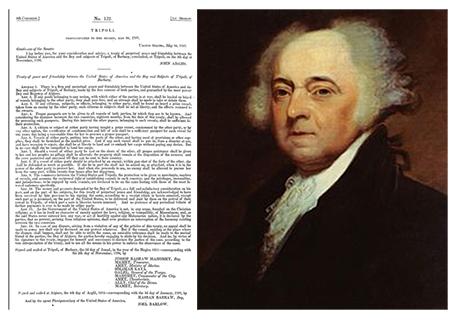 The late 18th century treaty reached by America with certain Muslim pirates of the African coast states:
The late 18th century treaty reached by America with certain Muslim pirates of the African coast states:
As the government of the United States of America is not in any sense founded on the Christian Religion,-as it has in itself no character of enmity against the laws, religion or tranquility of Musselmen,-and as the said States never have entered into any war or act of hostility against any Mehomitan nation, it is declared by the parties that no pretext arising from religious opinions shall ever produce an interruption of the harmony existing between the two countries. Article 11,
President George Washington appointed his old colleague David Humphreys as Commissioner Plenipotentiary on March 30, 1795, in order to negotiate a treaty with the Barbary powers.[6] On February 10, 1796, Humphreys appointed Joel Barlow and Joseph Donaldson as “Junior Agents” to forge a “Treaty of Peace and Friendship”.[7] Under Humphreys’ authority, the treaty was signed at Tripoli on November 4, 1796, and certified at Algiers on January 3, 1797. Humphreys reviewed the treaty and approved it in Lisbon on February 10, 1797.[7]
The official treaty was in Arabic text, and a translated version by Consul-General Barlow was ratified by the United States on June 10, 1797. Article 11 of the treaty was said to have not been part of the original Arabic version of the treaty; in its place is a letter from the Dey of Algiers to the Pasha of Tripoli. However, it is the English text which was ratified by Congress. Miller says, “the Barlow translation is that which was submitted to the Senate (American State Papers, Foreign Relations, II, 18-19) and which is printed in the Statutes at Large and in treaty collections generally; it is that English text which in the United States has always been deemed the text of the treaty.”[8]
The Treaty had spent seven months traveling from Tripoli to Algiers to Portugal and, finally, to the United States, and had been signed by officials at each stop along the way. There is no record of discussion or debate of the Treaty of Tripoli at the time that it was ratified. However, there is a statement made by President Adams on the document that reads:
President Adams’ signing statement
Now be it known, That I John Adams, President of the United States of America, having seen and considered the said Treaty do, by and with the advice and consent of the Senate, accept, ratify, and confirm the same, and every clause and article thereof. And to the End that the said Treaty may be observed, and performed with good Faith on the part of the United States, I have ordered the premises to be made public; And I do hereby enjoin and require all persons bearing office civil or military within the United States, and all other citizens or inhabitants thereof, faithfully to observe and fulfill the said Treaty and every clause and article thereof.
Official records show that after President John Adams sent the treaty to the Senate for ratification in May 1797, the entire treaty was read aloud on the Senate floor, and copies were printed for every Senator. A committee considered the treaty and recommended ratification. Twenty-three of the thirty-two sitting Senators were present for the June 7 vote which unanimously approved the ratification recommendation.